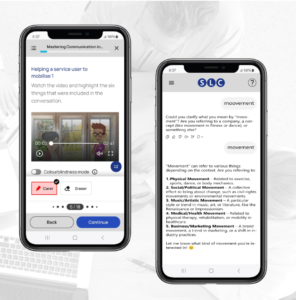
SLC win Ufi grant to develop AI language learning app for social carers
We’re delighted to have won a grant from Ufi VocTech Trust to develop an AI-driven technology solution that provides cheap phone-based language and communication skills

When using Medical English in conversation, it’s important that you’re as clear as possible. Your choice of vocabulary and phrasing is vital, but so is your use of NVC – or non-verbal communication. Strangely, it’s sometimes the lack of sound – or the pauses you use – that can help your fluency.
Pauses in speech are a useful way to break up long sentences. Using them gives the listener a chance to understand what you’re saying. They’re a natural tool for a native speaker. And if you decide to take the OET speaking exam, adding pauses in won’t only make you appear more natural. They’ll also give you a rest so you can gather your thoughts and decide what to say next.
Of course, you mustn’t pause for too long. But when taking an exam, adrenaline may mean that you speak too quickly without realising. Remembering to pause will slow down your speech. It’s probable that a break that you think has lasted forever has only lasted a second or less.
Where should you pause? Think of where you’d add a comma or full stop in written English. Add around a second for a comma, and two seconds for a full stop. Practise by recording yourself reading aloud a written piece. Afterwards, listen back and check whether you’ve put pauses in the right places.
However, it’s important when speaking that you don’t sound as if you’re reading from a script. Remember a previous conversation you had with a patient. Then repeat it in English, speaking into a recorder. Finally, and when you’re confident, record yourself speaking spontaneously in English.
Takeaways:
For more tips on how to pass the OET speaking exam, check out SLC’s two YouTube channels. One will help you to pass the OET exams, and the other will help you with Medical English advice.

Stephanie Lam is a writer, journalist, and English teacher. She specialises in writing fabulous words for the wellbeing and health industries.
SLC was the OET-accredited Premium Preparation Provider in Europe and is the leading provider of OET preparation services to the UK National Health Service.
SLC offers a wide range of OET preparation services, including self-study, tutoring, practice tests, and writing correction.
Get updates and get the latest materials on Medical English, OET and IELTS

We’re delighted to have won a grant from Ufi VocTech Trust to develop an AI-driven technology solution that provides cheap phone-based language and communication skills

We’re delighted to announce a partnership with leading Medical English app, Doxa.
